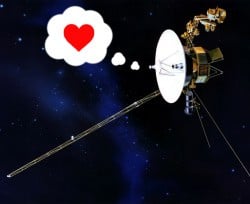On February 14, 1990, after nearly 13 years of travel through the outer Solar System, NASA's Voyager 1 spacecraft crossed the orbit of Pluto and turned its camera around, capturing photos of the planets as seen from that vast distance. It was a family portrait taken from over 4.4 billion kilometers away -- the ultimate space Valentine.
Who says astronomy isn't romantic?
[caption id="attachment_99940" align="aligncenter" width="580"]
Full mosaic of Voyager 1 images taken on Feb. 14, 1990 (NASA/JPL)[/caption]
– Carl Sagan
It was the unique perspective above provided by Voyager 1 that inspired Carl Sagan to first coin the phrase
"Pale Blue Dot"
in reference to our planet. And it's true… from the edges of the solar system Earth
is
just a pale blue dot in a black sky, a bright speck just like all the other planets. It's a sobering and somewhat chilling image of our world… but also inspiring, as the Voyager 1 and 2 spacecraft are now the farthest human-made objects in existence -- and getting farther every second. They still faithfully transmit data back to us even now, over 35 years since their
launches
, from 18.5 and 15.2 billion kilometers away.
The Voyagers sure know the value of a long-term relationship.
See more news from the Voyager mission here.
 Universe Today
Universe Today

